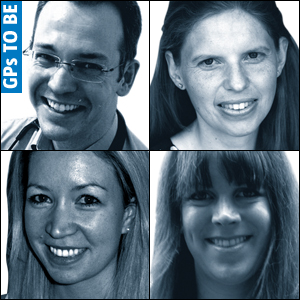Was my CSA exam supposed feel like doing the right thing while trying not to cry?

Forgive me for harping on about the Clinical Skills Assessment (CSA), but as you might recall from words gone by, at the end of March I sat ‘The Most Important Exam of My Life’ (TM). You might not have sat the exam yet, or may even be a proper GP who didn’t have to gain the MRCGP this way. So, I thought I would share with you what happens.
The day begins when you find the RCGP building’s exam centre via the back entrance, sign in, then move on to formal identification. Here, you have to hand over your mobile phone and prove you’re not trying to pass yourself off as Roger Neighbour in a wig.
You sign a few bits of paper without really looking at them (I think this was the prescribing station) and make your way to the candidate holding zone. The chief marshal then comes in and tells you something about a fire and answers a few questions, and after a brief pause the exam is underway.
The ‘examination suite’ is a sterile white, featureless corridor with numbered consultation rooms peeling off on both sides.
Once you find your room, a few minutes is given for settling in. Each room contains a desk with a few pieces of medical equipment that may come in useful – and a small metal toilet in the corner which has the most unusual feature of having coat hooks in it. The details of the 13 patients are presented on an iPad – in case you’re wondering where your RCGP subscription fee goes – then suddenly there’s a knock at the door and the exam begins.
At this point, it’s important to tell you that trainees sign a piece of paper tantamount to the Official Secrets Act. Discussing the cases is strictly forbidden, so all I can tell you is that some people came in for some things, and I did what I thought was right whilst trying not to cry. What I can say in all honesty is that one consultation ended with one of us not wearing any trousers, and another included an unfortunate misinterpretation of the word ‘violin’ as ‘violent’. Still, it went better than my finals when I managed to cover the actor in fake blood.
A queue of 13 patients goes by very quickly and before you can say ‘I’d like to give you a leaflet about this’ for the umpteenth time, it’s over. You pick up your belongings and what’s left of your dignity, and leave.
The most unusual feeling about the CSA is that once it’s over, you really have no idea how you’ve fared. I left with a sensation that I either ‘got’ what the case was looking for, or missed the point entirely. Some cases seemed straightforward (even too straightforward), whilst others had me tempted to write ‘I DON’T KNOW WHAT I’M DOING’ on the prescription pad and slide it toward the patient. The examiners are excellently stony-faced, and the actors are perfectly convincing.
A week passed before the results arrived and, fortuitously, I was successful.
Feedback from the exam is an incomprehensible series of marks in a grid which have to be cross-referenced with a PDF document, and that’s pretty much it.
With the CSA over, it’s time to dust off the CV, try and fit into my old suit and start thinking about getting a real job.
The question now is, will it be worth it in the end?
Dr Danny Chapman is a GPST3 in Exeter









